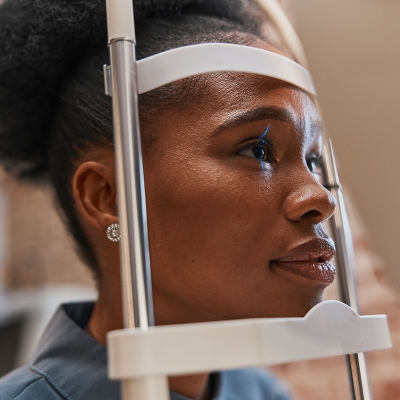6 reasons to consider LASIK surgery
Wear glasses or contacts (or both) and interested in possibly ditching them for good? Here’s why this surgical eye procedure may be a good idea.

If a person relies on glasses or contact lenses to see clearly, they may have thought about getting LASIK surgery, which may also be referred to as laser vision correction. It’s a procedure that uses a laser to reshape a person’s cornea (the clear round dome at the front of the eye). An ophthalmologist is a type of eye care provider that may perform surgery.
Here’s some good news: LASIK may correct certain vision errors such as nearsightedness (things appear blurry at a distance), farsightedness (things appear blurry up close) or astigmatism (blurry up close or at a distance). It may reduce the need for glasses or contact lenses — or even eliminate them for good.
While it may come with some risks (see below), LASIK is one of the more popular eye surgeries. In fact, it’s the most common refractive surgery, according to the American Academy of Ophthalmology.1
“LASIK can improve the quality of your life and daily functionality, whether it’s at a certain occupation or with the pursuit of a hobby or a life passion,” says Daniel C. Brocks, M.D. He’s a board-certified ophthalmologist and chief medical officer at the eye clinic BostonSight, and staff ophthalmologist with Beth Israel Deaconess Medical Center, both located in Needham, Massachusetts. “Addressing your visual needs offers you the ability to participate in meaningful activities, bringing more enjoyment to your life,” he says.
Still wondering whether to get LASIK? Here are 6 potential reasons to do so:
Ready to ditch your glasses or contacts and go for LASIK? Get more info on LASIK now.
Reason #1: LASIK may give a person better eyesight.
Some people might wonder whether LASIK does the job. According to the American Academy of Ophthalmology, about 90% of people who have LASIK could end up with vision between 20/20 and 20/40, without a need for glasses or contact lenses.2
Besides potentially making it easier for people to see things better at a distance, up close or both, LASIK may also improve contrast sensitivity. That’s the ability to perceive and clearly identify outlines of very small objects and make out slight differences in patterns and shading.3 That may help people who have vision issues while driving at night, notes Dr. Brocks.
Reason #2: LASIK may save a person money in the long run.
LASIK may end up saving a person a lot of money in the future, simply because they may not need to buy glasses or contact lenses anymore. That also may include things like contact lens solution and “any other associated costs such as extra eye doctor visits,” says Dr. Brocks. “LASIK can be financially beneficial, an investment that pays off over time.”
If a person has UnitedHealthcare Vision insurance, they may get up to 35% off laser vision correction services, and they can schedule a free exam.
Reason #3: LASIK could help a person avoid issues with glasses or contact lenses.
Glasses might be a fashion statement for some people. But they may also be undesirable or uncomfortable for others, especially if a person has to wear them for long periods of time.
Also, people who wear contact lenses may experience eye irritation or infections of the cornea if they wear them too long or don’t practice proper hygiene. Irritation and infection may damage vision, says Dr. Brocks.
But if a person gets LASIK surgery, they may be able to do away with those issues by not having to wear glasses or contact lenses anymore.
Reason #4: LASIK could make a person’s job easier.
Glasses or contact lenses may interfere with some people’s ability to do certain jobs. Dr. Brocks offers these professions as an example:
- Chefs
- Construction workers
- Police officers
- Those in the armed services
“On the job, glasses can fog up, making it hard to see, and irritation from contact lenses can be uncomfortable,” he explains.
Reason #5: LASIK could make exercising and playing sports safer.
Many types of physical activity or sports may be more difficult to do if a person is wearing glasses. For instance, it may be harder to keep a pair of glasses on if a person is doing certain yoga poses or playing a game of touch-football.
Glasses may also be in danger of breaking when a person plays basketball or baseball. And a person may not be able to see in a pool, ocean or lake if they’re not wearing their glasses. It also may not be a good idea to wear contact lenses while swimming, because it may lead to eye infections.4
But with LASIK, a person may no longer have to worry about wearing glasses that may:
- Become damaged or broken
- Get in the way
- Slip or fall off
Also, if they don’t have to wear contact lenses, they may be safer in the water too.
Reason #6: LASIK may make it easier to travel.
If a person may be planning to travel, worrying about their glasses or contact lenses may make going on a trip less enjoyable. It may even mean less packing.
“One of the benefits of LASIK is that when you’re going away, you don’t have to carry multiple pairs of glasses, worry they’ll break, that you’ll lose contact lenses or have to bring solution with you,” says Dr. Brocks. A person may also not have to worry about whether they packed their glasses or contacts in their luggage or if they may get lost, he adds.
One study by the Refractive Surgery Council found that 32% of Americans believe their travels would be much more enjoyable without having to deal with glasses or contacts. Plus, 55% of those polled said a vision correction surgery, such as LASIK, could enhance their travel experiences.5
What might some risks be of getting LASIK surgery?
While there may be some good reasons to get LASIK surgery, LASIK may also come with some risks. These could affect a person both temporarily and in rare cases, permanently.
Examples of temporary or permanent issues, due to LASIK surgery, could include:6, 7
- Decrease in contrast sensitivity, which could make objects appear fuzzy or gray, even for people with 20/20 vision
- Discomfort or pain in the eyes
- Glare, halos, starbursts or ghost images
- Hazy, blurry, foggy or double vision
- Infection of the cornea
- Scarring or long-term issues with the shape of the cornea, which could make it impossible to wear contact lenses
- Scratchiness, dryness or other dry eye symptoms
- Sensitivity to light
- Small pink or red patches of blood on the white part of the eyes
LASIK surgery may also not be a good idea for people who may be pregnant or breastfeeding, or those who may be taking certain medications. It may be a good idea to talk to an eye care provider or a person’s primary care doctor before choosing LASIK surgery.
Could LASIK be right for you? Schedule a free LASIK exam to find out.
Sources:
- What is refractive surgery? American Academy of Ophthalmology, February 2023.
- LASIK — laser eye surgery American Academy of Ophthalmology, May 2024.
- Contrast sensitivity National Institutes of Health: StatPearls, last updated June 2023.
- Healthy habits: Keeping water away from contact lenses Centers for Disease Control and Prevention, April 2024.
- Are your glasses and contacts creating vacation FOMO? Refractive Surgery Council, October 2023.
- Facts about LASIK complications American Academy of Ophthalmology, February 2023.
- LASIK eye surgery National Library of Medicine: Medline Plus, last reviewed January 2024.


